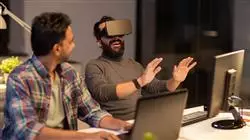University certificate
Scientific endorser

The world's largest faculty of information technology”
Introduction to the Program
Position yourself in a booming industry, with the best program in the university landscape that only TECH can offer you”

Virtual Reality transports us to immersive worlds, allowing experiences ranging from the simulation of complex surgeries to architectural design in real time. The impact of this discipline transcends the technological sphere, as it is shaping the way we live, work and learn. Its constant evolution not only demands professionals trained to implement these tools, but also visionaries capable of expanding their applications to new horizons.
Computer Vision gives machines the ability to interpret and analyze images and videos, enabling the development of advanced technologies. These include autonomous vehicles, which are revolutionizing transportation, and medical diagnostic platforms, which improve accuracy and efficiency in healthcare. In addition, recent advances in this field, such as multitasking models and generative technologies, are opening up new possibilities in the creation of innovative solutions. Integration with edge computing has also facilitated real-time data processing, which further expands the applications of Computer Vision. For all these reasons, being a professional trained in these disciplines not only opens doors in a technology sector in constant growth, but also allows you to be part of projects that have a real impact on daily life. It also contributes to the development of technologies that continue to transform the way we interact with the world and improve our quality of life.
The TECH curriculum, together with its 100% online methodology and Relearning learning approach, allows the student to fully concentrate on the key subjects to specialize in these technological areas. In addition, the graduate will have the support of the most specialized faculty and the most updated research in the university field. All this without timetables and from anywhere in the world, which allows students to adapt their studies to their own pace, without interfering with their personal or work commitments.
The combination of creativity and technology is waiting for you to start developing great solutions with a global impact”
This Advanced master’s degree in Virtual Reality and Computer Vision contains the most complete and up-to-date program on the market. The most important features include:
- Practical cases presented by experts in IT
- The graphic, schematic, and practical contents with which they are created, provide scientific and practical information on the disciplines that are essential for professional practice
- Practical exercises where self-assessment can be used to improve learning
- Its special emphasis on innovative methodologies in Virtual Reality and Computer Vision
- Theoretical lessons, questions to the expert, debate forums on controversial topics, and individual reflection assignments
- Content that is accessible from any fixed or portable device with an Internet connection
Become the best in Virtual Reality and Computer Vision, at your own pace, without schedules and from anywhere in the world”
Its teaching staff includes professionals from the field of journalism, who bring to this program the experience of their work, as well as renowned specialists from reference societies and prestigious universities.
The multimedia content, developed with the latest educational technology, will provide the professional with situated and contextual learning, i.e., a simulated environment that will provide an immersive learning experience designed to prepare for real-life situations.
This program is designed around Problem-Based Learning, whereby the student must try to solve the different professional practice situations that arise throughout the program. For this purpose, the professional will be assisted by an innovative interactive video system created by renowned and experienced experts.
Master these technologies with the didactic tools that TECH offers you and start changing lives"

Develop applications and live the most exciting challenges in the world's largest online university"
Why study at TECH?
TECH is the world’s largest online university. With an impressive catalog of more than 14,000 university programs available in 11 languages, it is positioned as a leader in employability, with a 99% job placement rate. In addition, it relies on an enormous faculty of more than 6,000 professors of the highest international renown.

Study at the world's largest online university and guarantee your professional success. The future starts at TECH”
The world’s best online university according to FORBES
The prestigious Forbes magazine, specialized in business and finance, has highlighted TECH as “the world's best online university” This is what they have recently stated in an article in their digital edition in which they echo the success story of this institution, “thanks to the academic offer it provides, the selection of its teaching staff, and an innovative learning method aimed at educating the professionals of the future”
A revolutionary study method, a cutting-edge faculty and a practical focus: the key to TECH's success.
The most complete study plans on the university scene
TECH offers the most complete study plans on the university scene, with syllabuses that cover fundamental concepts and, at the same time, the main scientific advances in their specific scientific areas. In addition, these programs are continuously being updated to guarantee students the academic vanguard and the most in-demand professional skills. In this way, the university's qualifications provide its graduates with a significant advantage to propel their careers to success.
TECH offers the most comprehensive and intensive study plans on the current university scene.
A world-class teaching staff
TECH's teaching staff is made up of more than 6,000 professors with the highest international recognition. Professors, researchers and top executives of multinational companies, including Isaiah Covington, performance coach of the Boston Celtics; Magda Romanska, principal investigator at Harvard MetaLAB; Ignacio Wistumba, chairman of the department of translational molecular pathology at MD Anderson Cancer Center; and D.W. Pine, creative director of TIME magazine, among others.
Internationally renowned experts, specialized in different branches of Health, Technology, Communication and Business, form part of the TECH faculty.
A unique learning method
TECH is the first university to use Relearning in all its programs. It is the best online learning methodology, accredited with international teaching quality certifications, provided by prestigious educational agencies. In addition, this disruptive educational model is complemented with the “Case Method”, thereby setting up a unique online teaching strategy. Innovative teaching resources are also implemented, including detailed videos, infographics and interactive summaries.
TECH combines Relearning and the Case Method in all its university programs to guarantee excellent theoretical and practical learning, studying whenever and wherever you want.
The world's largest online university
TECH is the world’s largest online university. We are the largest educational institution, with the best and widest online educational catalog, one hundred percent online and covering the vast majority of areas of knowledge. We offer a large selection of our own degrees and accredited online undergraduate and postgraduate degrees. In total, more than 14,000 university degrees, in eleven different languages, make us the largest educational largest in the world.
TECH has the world's most extensive catalog of academic and official programs, available in more than 11 languages.
Google Premier Partner
The American technology giant has awarded TECH the Google Google Premier Partner badge. This award, which is only available to 3% of the world's companies, highlights the efficient, flexible and tailored experience that this university provides to students. The recognition as a Google Premier Partner not only accredits the maximum rigor, performance and investment in TECH's digital infrastructures, but also places this university as one of the world's leading technology companies.
Google has positioned TECH in the top 3% of the world's most important technology companies by awarding it its Google Premier Partner badge.
The official online university of the NBA
TECH is the official online university of the NBA. Thanks to our agreement with the biggest league in basketball, we offer our students exclusive university programs, as well as a wide variety of educational resources focused on the business of the league and other areas of the sports industry. Each program is made up of a uniquely designed syllabus and features exceptional guest hosts: professionals with a distinguished sports background who will offer their expertise on the most relevant topics.
TECH has been selected by the NBA, the world's top basketball league, as its official online university.
The top-rated university by its students
Students have positioned TECH as the world's top-rated university on the main review websites, with a highest rating of 4.9 out of 5, obtained from more than 1,000 reviews. These results consolidate TECH as the benchmark university institution at an international level, reflecting the excellence and positive impact of its educational model.” reflecting the excellence and positive impact of its educational model.”
TECH is the world’s top-rated university by its students.
Leaders in employability
TECH has managed to become the leading university in employability. 99% of its students obtain jobs in the academic field they have studied, within one year of completing any of the university's programs. A similar number achieve immediate career enhancement. All this thanks to a study methodology that bases its effectiveness on the acquisition of practical skills, which are absolutely necessary for professional development.
99% of TECH graduates find a job within a year of completing their studies.
Advanced Master's Degree in Virtual Reality and Computer Vision
Although the creation of immersive artificial environments seemed distant scenarios in time, the accelerated evolution of computer technology has not only made it possible for users to access these tools, but has also allowed them to be successfully integrated into different fields such as video games, education and architecture. As the future of this technology shows a promising future, at TECH Global University we have developed the Advanced Master's Degree in Virtual Reality and Computer Vision, a program that will provide you with the latest knowledge available in this field so that you can specialize in the most important developments produced, the mastery of cutting-edge tools such as Unreal Engine and the most advanced techniques of 3D digital image processing, among other aspects. In this way, you will be able to join the most ambitious projects of consolidated companies and become a reference expert in the sector.
Become a specialist in Virtual Reality and Computer Vision
If your objectives include achieving a higher level of knowledge in the study of information technology, this program is for you. In TECH Global University you will receive a comprehensive and high-quality education, since we have the most complete content of the educational market, innovative learning methods for online education and the support of experts who will guide your process. Thereby, you will have access to techniques, strategies, programs and resources that will favor the performance of your work in the modeling and simulation of sensory, three-dimensional and artificial environments. This Advanced Master's Degree is a new and effective opportunity to guarantee your professional growth.







